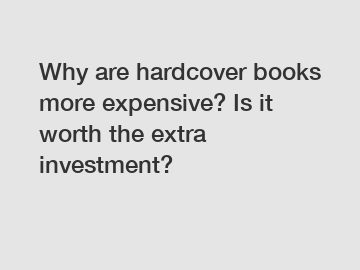Why are hardcover books more expensive? Is it worth the extra investment?
Why are hardcover books more expensive? Is it worth the extra investment?
Hardcover books have always been perceived as a luxury item in the book market, and the higher price tag attached to them often raises questions about their worth. In this article, we will delve into the reasons behind the increased cost of hardcovers, explore the justification for their premium prices, and examine the impact they have on readers and the publishing industry.
1. The Manufacturing Process.

The production of hardcover books involves a more complex and extensive manufacturing process compared to their paperback counterparts. Hardcover books require additional materials like board, cloth, or leather for the cover, which contributes to their overall cost. Additionally, the durability of the hardcover binding necessitates meticulous craftsmanship to withstand the test of time. These factors result in a higher production cost which, in turn, translates into a higher retail price.
2. Perceived Value.
Hardcover books are often associated with a sense of prestige and permanence. The sturdy cover, the weight in hand, and the durability contribute to the perceived value of a hardcover edition. Many readers view hardcovers as collector's items and are willing to pay a premium price to own a book that will last for generations. The higher price tag adds a sense of exclusivity and contributes to the overall reading experience.
3. Limited Editions and Special Features.
Publishers often release limited edition hardcover books with added features such as glossy pages, special illustrations, or bonus content. These editions cater to collectors or dedicated fans of a particular book or author. The inclusion of these unique elements not only enhances the aesthetic appeal but also provides an immersive reading experience. Consequently, the added value of these special edition hardcovers justifies the higher price point.
The impact of hardcover books goes beyond their individual worth. Publishers heavily rely on sales of hardcovers to support the creation of new titles. The revenue generated from hardcover sales allows publishers to take risks and invest in lesser-known authors or niche genres. Furthermore, the increased profit margin from hardcovers helps subsidize the production of paperback and e-book editions, which are often priced more affordably.
For readers, hardcover books offer tangible benefits that enhance the reading experience. The quality construction ensures that the book remains in pristine condition even after multiple reads, preserving its value over time. Moreover, hardcovers also make for treasured collectibles, often holding sentimental value for avid readers.
In conclusion, the higher cost of hardcover books can be attributed to their intricate manufacturing process, perceived value, and additional features. While they may not be a suitable investment for everyone, those who cherish the physicality and longevity of books often find hardcovers worth the extra expense. The impact of hardcover books extends to the publishing industry, supporting the creation of new works and allowing readers to indulge in a luxurious reading experience.
If you want to learn more, please visit our website customized hardcover book printing, gold foil hardcover book printing, comic paperback book printing.
174
0
0


Comments
All Comments (0)